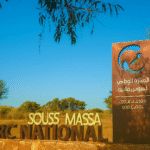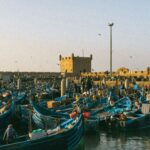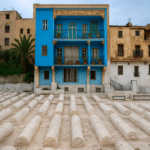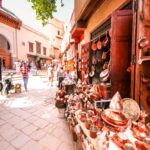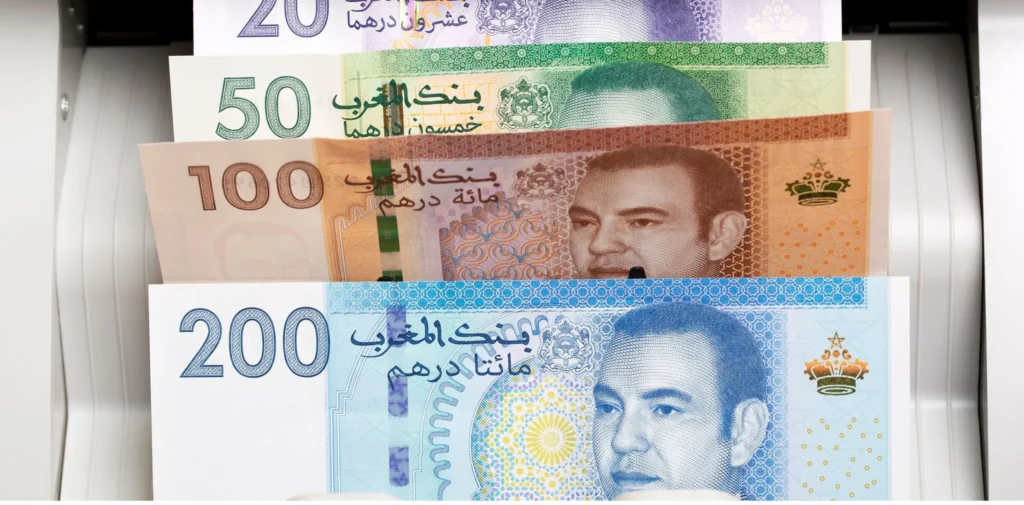
Mastering Moroccan Currency: 7 Essential Tips for a Hassle-Free Trip
Traveling to Morocco means knowing about its money and currency. This guide covers the Moroccan currency, exchange rates, and how to pay. You’ll learn about cash, credit cards, and ATMs. It also talks about budgeting, tipping, and bargaining.
This guide also looks at Morocco’s banking and digital payments. It talks about mobile banking and the rise of fintech and cryptocurrency. Knowing about Morocco’s money is important for a great trip and avoiding money problems.
Table of Contents
- Overview of Moroccan Currency: The Dirham
- Exchange Rates and Currency Conversion
- Cash, Credit Cards, and ATMs in Morocco
- Budgeting for Your Trip to Morocco
- Tipping Etiquette in Morocco
- Currency & Money Morocco
- Bargaining and Negotiating Prices
- Money Transfer Services in Morocco
- The Moroccan Banking System
- Digital Payments and Mobile Banking in Morocco
- Cryptocurrency and Fintech in Morocco
Overview of Moroccan Currency: The Dirham
When you travel to Morocco, knowing the local currency is key. The Moroccan dirham (MAD) is the official money. The Central Bank of Morocco, or Bank Al-Maghrib, manages it.
The dirham has banknotes and coins. Banknotes are in 20, 50, 100, and 200 dirham values. They show Morocco’s culture through colors and designs.
Coins range from 1 centime to 10 dirhams. They’re used for small purchases. It’s wise to carry both banknotes and coins for easy transactions.
Knowing the dirham’s look and value is important. Learning about it before your trip helps avoid confusion. Also, remember the dirham is only exchanged in Morocco.
For exchanging money, go to trusted places like banks. This way, you get good rates and avoid scams. Understanding the dirham makes your Moroccan trip smoother.
Exchange Rates and Currency Conversion
Traveling to Morocco means understanding exchange rates and currency conversion. This ensures you get the most value for your money. The Moroccan dirham (MAD) is Morocco’s official currency. Its value changes due to economic factors.
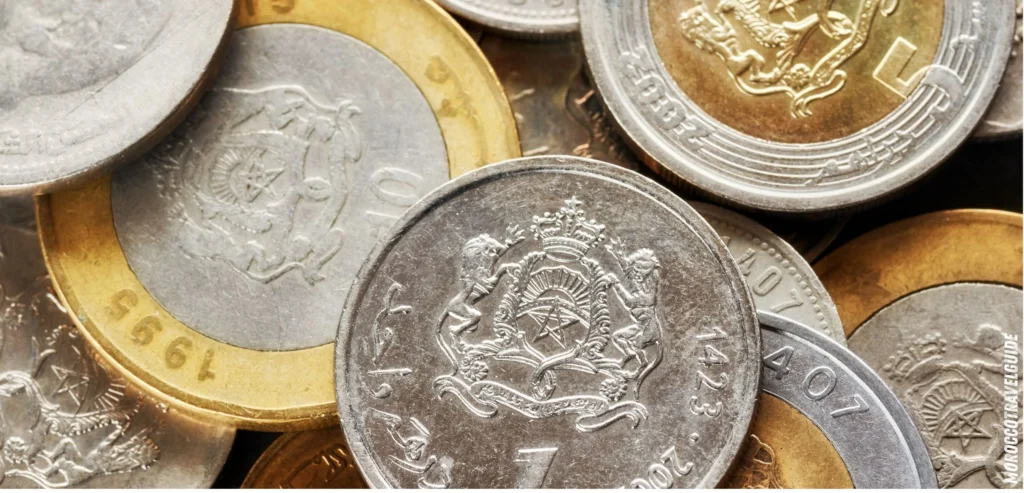
As of 2023, 10 MAD equals about 1 USD. But, always check the latest exchange rates before you go.
To change your money to dirhams, you have a few options. Banks and official exchange offices, or “bureaux de change,” are good choices. They offer fair rates and a safe place to exchange money. Some hotels also exchange currency, but their rates might not be as good.
Be careful of exchange rate changes and fees when you exchange money. It’s smart to compare rates at different places to get the best deal. Remember, rates can change based on how much money you’re exchanging and the bill denominations.
If you plan to use credit or debit cards, tell your bank you’re traveling. Some banks charge extra for international transactions. ATMs are common in big cities and tourist spots, making it easy to get local currency.
Knowing about exchange rates and currency conversion helps you manage your money in Morocco. Whether you exchange cash or use cards and ATMs, a bit of planning makes your trip smoother and more enjoyable.
Cash, Credit Cards, and ATMs in Morocco
Traveling to Morocco means knowing how to pay for things. Cash is key in small shops and markets. It’s smart to carry some Moroccan Dirhams for everyday costs.
Credit cards are getting more common, especially in big cities. Hotels, fancy restaurants, and big stores take Visa and Mastercard. But, small places and local markets might not accept them, so cash is still best.
ATMs are easier to find in Morocco now, especially in big cities. You can find them at banks, malls, and some gas stations. But, watch out for foreign transaction fees from your bank. Use a card with low or no fees to save money.
Be careful with ATMs to avoid scams. Cover the keypad when you enter your PIN. If an ATM looks off, don’t use it. Also, tell your bank you’re traveling to avoid account blocks.
Carrying both cash and credit cards is smart in Morocco. It lets you use the best payment options and rates. With these tips, you can enjoy Morocco without money worries.
Budgeting for Your Trip to Morocco
Planning your trip to Morocco means setting a realistic budget. This helps ensure a smooth and enjoyable journey. Think about daily costs like where you stay, how you get around, and what you eat and drink.
Travelers’ daily expenses in Morocco vary. Budget travelers might spend $30-$50 a day. Mid-range travelers could spend $50-$100 a day. Those looking for luxury might spend over $100 a day.
Accommodation in Morocco ranges from cheap to expensive. In cities like Marrakech and Casablanca, hostels start at $10-$20 a night. Mid-range hotels cost $50-$100 a night. Luxury hotels can be over $200 a night.
Transport in Morocco is affordable. Local buses and shared taxis are cheap, starting at a few dirhams. Private taxis and car rentals are pricier but offer more comfort. Train or bus travel between cities is also affordable, with prices based on distance and service class.
Eating out in Morocco is cheap, especially for local food. A meal at a budget place or street stall is $3-$5. Mid-range meals cost $10-$20. Alcohol is pricier and less common due to Morocco’s Muslim culture.
To keep to your budget, track your spending and adjust as needed. Look for deals and discounts, like haggling at markets or booking during off-peak times. With smart spending, you can have a memorable and affordable trip to Morocco.
Tipping Etiquette in Morocco
Traveling to Morocco means knowing about local tipping customs. Tipping is a way to show thanks for good service. But, the amounts and when to tip can be different from home.
In Moroccan restaurants, leave 10-15% of the bill as a tip. Some fancy places might already have a service charge. For casual spots, just rounding up or leaving a few dirhams is enough.
At hotels, tip porters and bellhops 10-20 dirhams per bag. Housekeeping gets 10-20 dirhams a day. If the concierge or staff go above and beyond, give them a bigger thank you.
Tour guides and drivers count on tips for their income. For a half-day, tip your guide 50-100 dirhams. A full-day tour deserves 100-200 dirhams. Taxi drivers don’t usually get tips, but rounding up is nice.
Remember, tipping should be based on the service quality. Service workers in Morocco depend on tips to make ends meet. Your tips can greatly help them. By following local customs, you show appreciation and help make your trip better.
Currency & Money Morocco
Traveling to Morocco means knowing how to exchange money safely. Official currency exchange offices are everywhere, but beware of black market deals. These deals might seem good but often involve fake money, which can cause big financial problems.
Stick to using banks or authorized currency exchange offices for a safe exchange. They offer good rates and ensure the money is real. Knowing what real Moroccan Dirhams look like can also help avoid fake bills.
Keeping your money safe in Morocco is key. Use a money belt or a hidden pouch for your cash and important documents. Also, don’t carry too much cash in public, especially in busy places.
In Morocco, haggling is a big part of shopping, especially in markets. To bargain well, be friendly, patient, and respectful. Start with a lower price than you want to pay and work up to a fair deal. Remember, haggling is a big part of Moroccan culture and can lead to better deals.
By following these tips, you can have a safe and enjoyable trip to Morocco. Always be careful, use trusted exchange services, and enjoy haggling to make the most of your visit.
Bargaining and Negotiating Prices
Exploring Morocco’s markets and souks shows you the haggling culture is key. It’s not just about buying things; it’s about the fun of negotiating. To get the most out of it, knowing how to negotiate and being culturally sensitive is crucial.
Before you start shopping, learn about the prices of what you want. This helps you know when you’re getting a good deal. When you see something you like, ask the vendor the price. Remember, this is usually higher than the real price, leaving room for talks.
Start by offering half to two-thirds of the vendor’s price. Then, go back and forth until you both agree. Always be polite and friendly. If you can’t agree, walking away might make them offer a better price.
Bargaining in Morocco is more than just getting a good deal. It’s about connecting with people and learning about their crafts. With a smile and an open mind, your haggling culture experience will be unforgettable.
Money Transfer Services in Morocco
Traveling to Morocco or sending money to loved ones there is easier with the right services. Western Union and MoneyGram are well-known in Morocco. They offer reliable ways to send and receive money.
These companies have many agent locations across the country. This makes it simple for recipients to get their money.
Digital remittance platforms are also popular in Morocco. They often have better exchange rates and lower fees than traditional providers. It’s important to have the right documents, like a passport or ID card, when using these services.
Know the fees and exchange rates of each provider. They can change a lot. Also, the time it takes to send or receive money can vary.
Money transfer services are key to Morocco’s economy. Many families and businesses depend on money sent from abroad. In 2020, Morocco received $7.4 billion in remittances. This money helps with spending, investments, and starting businesses.
When sending money, pick a trusted provider. Look at fees, exchange rates, and how long it takes. Whether it’s Western Union, MoneyGram, or a digital platform, knowing your options helps make the process smoother.
The Moroccan Banking System
Morocco has a well-developed banking system. Several major banks operate across the country. They offer services like savings accounts, loans, and foreign currency exchange. The Central Bank of Morocco regulates these banks, ensuring financial stability.
Visitors to Morocco can easily access banking services. ATMs are common in cities and towns. They allow you to withdraw cash with international cards. But, some ATMs charge extra for foreign card use, so check with your bank first.
Credit cards are becoming more accepted in Morocco. This is true for hotels, restaurants, and shops. Still, it’s smart to carry cash for small buys or unexpected issues.
For those staying long-term or doing business in Morocco, opening a bank account might be needed. You’ll need a passport, proof of address, and a deposit. Some banks ask for more, like a job contract. It’s key to compare banks and their services before choosing. Remember, Moroccan banking rules might be different from yours, so learn about them.
Digital Payments and Mobile Banking in Morocco
In recent years, Morocco has seen a big increase in digital payments and mobile banking. This has led to more people having access to financial services. Platforms like M-Pesa and Orange Money have made it easy for Moroccans to manage their money on their phones.
Using digital financial services in Morocco has many benefits. It helps more people get banking services, cuts down on cash use, and boosts online shopping. Mobile wallets and apps make it simple to send money, pay bills, and shop online. This makes the financial system more efficient and clear.
But, there are challenges in Morocco’s digital payment and mobile banking world. Security and rules need to be improved to keep users’ data safe. Also, teaching people about these services is key to getting more people to use them.
For travelers in Morocco, digital payments and mobile banking are a good choice. Many global payment systems work with Moroccan platforms. This means easy transactions for visitors. They can sign up for these services when they arrive, with low fees and simple steps.
As Morocco keeps moving forward with digital payments and mobile banking, it’s set to lead in financial tech in the area. This growth helps Moroccans and boosts the country’s economy and global standing.
Cryptocurrency and Fintech in Morocco
Morocco is seeing more interest in cryptocurrency and fintech. The country is embracing digital assets and blockchain technology. More people are using bitcoin and other cryptocurrencies for investments and payments.
Fintech startups are also popping up. They offer new solutions for the Moroccan market. This shows the growing interest in digital finance.
The rules for cryptocurrency and fintech in Morocco are still being worked out. The central bank, Bank Al-Maghrib, is cautious but sees the benefits of blockchain. The government aims to create a legal framework that supports innovation and protects people.
Cryptocurrency and fintech could change finance in Morocco. They could make banking more accessible to everyone. Fintech can also make transactions faster and cheaper, helping Morocco’s economy grow.
The mix of cryptocurrency and fintech is exciting for Morocco. As rules get clearer and more startups appear, Morocco could become a leader in digital finance. This could boost the economy and improve people’s lives.

